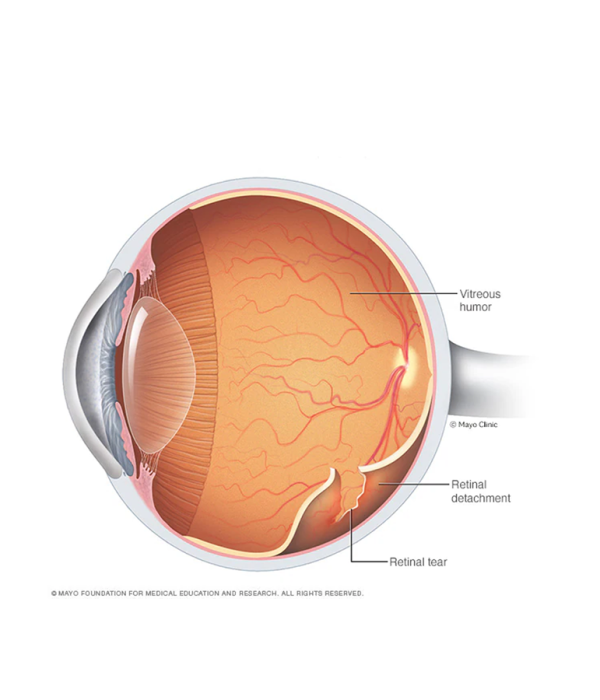Detached retina & retinal holes
What is retinal detachment?
Retinal detachment is an eye problem that happens when your retina (a light-sensitive layer of tissue in the back of your eye) is pulled away from its normal position at the back of your eye.
What are the symptoms of retinal detachment?
If only a small part of your retina has detached, you may not have any symptoms.
But if more of your retina is detached, you may not be able to see as clearly as normal, and you may notice other sudden symptoms, including:
- A lot of new floaters (small dark spots or squiggly lines that float across your vision)
- Flashes of light in one eye or both eyes
- A dark shadow or “curtain” on the sides or in the middle of your field of vision

Retinal detachment is a medical emergency.
If you have symptoms of a detached retina, it’s important to go to your eye doctor or the emergency room right away.
The symptoms of retinal detachment often come on quickly. If the retinal detachment isn’t treated right away, more of the retina can detach — which increases the risk of permanent vision loss or blindness.

Am I at risk for retinal detachment?
Anyone can have a retinal detachment, but some people are at higher risk. You are at higher risk if:
- You or a family member has had a retinal detachment before
- You’ve had a serious eye injury
- You’ve had eye surgery, like surgery to treat cataracts
Some other problems with your eyes may also put you at higher risk, including:
- Diabetic retinopathy (a condition in people with diabetes that affects blood vessels in the retina)
- Extreme nearsightedness (myopia), especially a severe type called degenerative myopia
- Posterior vitreous detachment (when the gel-like fluid in the center of the eye pulls away from the retina)
- Certain other eye diseases, including retinoschisis (when the retina separates into 2 layers) or lattice degeneration (thinning of the retina)
If you’re concerned about your risk for retinal detachment, talk with your eye doctor.
What causes retinal detachment?
There are many causes of retinal detachment, but the most common causes are aging or an eye injury.
There are 3 types of retinal detachment: rhegmatogenous, tractional, and exudative. Each type happens because of a different problem that causes your retina to move away from the back of your eye.
How can I prevent retinal detachment?
Since retinal detachment is often caused by aging, there’s often no way to prevent it. But you can lower your risk of retinal detachment from an eye injury by wearing safety goggles or other protective eye gear when doing risky activities, like playing sports.
If you experience any symptoms of retinal detachment, go to your eye doctor or the emergency room right away. Early treatment can help prevent permanent vision loss.
It’s also important to get comprehensive dilated eye exams regularly. A dilated eye exam can help your eye doctor find a small retinal tear or detachment early, before it starts to affect your vision.
Am I at risk for retinal detachment?
Anyone can have a retinal detachment, but some people are at higher risk. You are at higher risk if:
- You or a family member has had a retinal detachment before
- You’ve had a serious eye injury
- You’ve had eye surgery, like surgery to treat cataracts
Some other problems with your eyes may also put you at higher risk, including:
- Diabetic retinopathy (a condition in people with diabetes that affects blood vessels in the retina)
- Extreme nearsightedness (myopia), especially a severe type called degenerative myopia
- Posterior vitreous detachment (when the gel-like fluid in the center of the eye pulls away from the retina)
- Certain other eye diseases, including retinoschisis (when the retina separates into 2 layers) or lattice degeneration (thinning of the retina)
If you’re concerned about your risk for retinal detachment, talk with your eye doctor.
What causes retinal detachment?
There are many causes of retinal detachment, but the most common causes are aging or an eye injury.
There are 3 types of retinal detachment: rhegmatogenous, tractional, and exudative. Each type happens because of a different problem that causes your retina to move away from the back of your eye.


